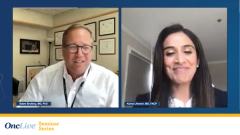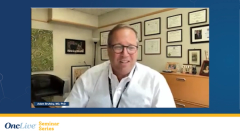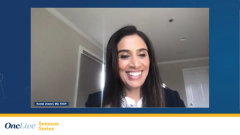
Audience Q&A: Future Directions in Breast Cancer Care
Closing out the discussion on molecular targets and clinical trials in breast cancer, expert oncologists take time to field questions from the live audience.
Transcript:
Komal Jhaveri, MD, FACP: Let’s take a look at some questions from the audience. [Concerning the] treatment of ESR1 mutations, what are they? That’s a great question. We were briefly talking about that. We see about 40% in the plasma, and they’re usually acquired after aromatase inhibitors [AIs] in the metastatic setting. We’re thinking about utilizing a SERD [selective estrogen receptor degrader], given what we’ve learned from the analyses of the SOPHIA and the EFECT trials, where the benefit was seen with the SERD over a steroidal AI-like exemestane.
Adam Brufsky, MD, PhD: I agree with you on that as well.
Komal Jhaveri, MD, FACP: Adam, how was nodal status determined in the KEYNOTE-522 and monarchE [trials]? How should we use the affinity data now that we do a lot of neoadjuvant therapy?
Adam Brufsky, MD, PhD: The nodal status in KEYNOTE-522 was clinical for the neoadjuvant and for the adjuvant was based on pathology. The APHINITY data were confirmatory data from all neoadjuvant studies because the question was, “Does the pCR [pathologic complete response] rate correspond to event-free survival?” It was more of a confirmatory study in that setting. I still will give HP [trastuzumab, pertuzumab] if someone has a pCR. That’s what that question is getting at. If they don’t have a pCR, then I’ll try to enroll them in…, which is T-DXd [trastuzumab deruxtecan] vs T-DM1 [trastuzumab emtansine] for…disease. If I can’t get them on trial, then I’ll give T-DM1 [trastuzumab emtansine]. That’s generally how I do it.
I’ll give you the last question because it’s right up your alley. What do you think about PI3 kinase’s early stage prognostic info? We already talked about the recent testing updates.
Komal Jhaveri, MD, FACP: We’ve had some data that came from Kevin Kalinsky and Mary Ellen Moynahan when Kevin was at Memorial [Sloan Kettering Cancer Center] with Mary Ellen, who has since retired. We looked at some data sets in which early stage [disease] had a good prognosis. It did not have a bad prognosis, but that’s not what we’ve seen in the metastatic setting. Data from the SAFIR02_BREAST trial and other data sets suggested that PIK3CA mutations can have a bearing, and it’s a poor prognostic marker. That could be related to lack of nodal disease in the early stage and potentially not having high-risk patients. The data sets aren’t necessarily very clean to look at. But that’s a great question. In the metastatic setting, it’s a poor prognostic factor. Now that we have therapies for it in the metastatic setting, we offer PI3K with fulvestrant for those patients.
Adam Brufsky, MD, PhD: I completely agree. PI3 kinase is really interesting. It argues what it’s doing in the tumors in the metastatic setting vs the early stage. It’s going to be a fascinating 3 to 5 years, sorting that out from a preclinical setting.
We’ve gone over everything. We almost made those like other OncLive® discussions, at 90 minutes. There’s only 2 of us, not 4. But when you put us together, we can talk forever. I appreciate everybody staying on for another 15 minutes. Do you have any final comments on this, Komal?
Komal Jhaveri, MD, FACP: This is a very exciting time. Antibody-drug conjugates are here to stay. We have a lot more work to do when it comes to biomarkers, rational combination strategies, and sequencing the right therapies. But it’s very exciting to see that we have a lot more understanding of who should need more and who should need less, and these newer drugs are really helping. It’s an exciting time.
Adam Brufsky, MD, PhD: I agree. It’s a really exciting time to be a breast cancer medical oncologist because we have a lot of interesting ideas and therapies that are extending survival. With that, thank you very much. Thanks, everybody, for listening for an additional 15 minutes. This is being recorded, so people can see this on their own later. I thank OncLive® for having us. Thanks again, Komal. I’ll see you soon.
Komal Jhaveri, MD, FACP: Thank you so much, Adam. Thank you to OncLive® and thank you all for staying along.
Transcript edited for clarity.









































